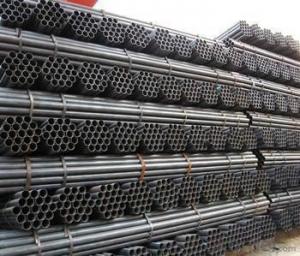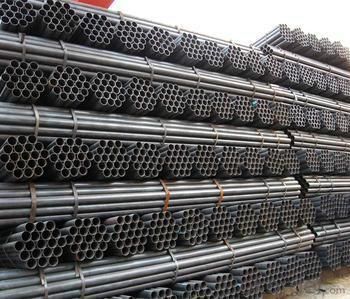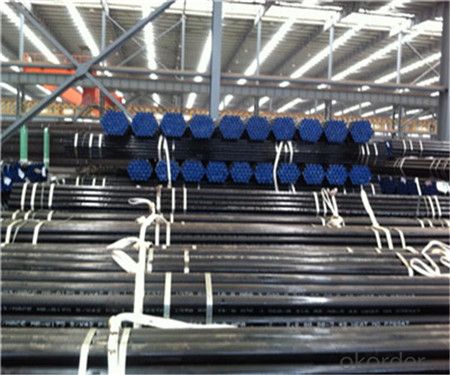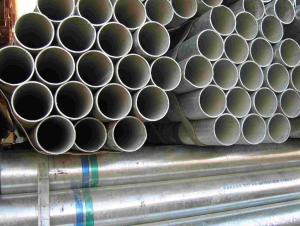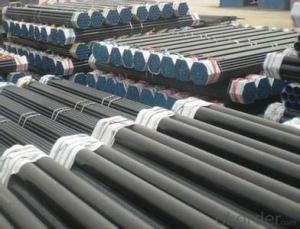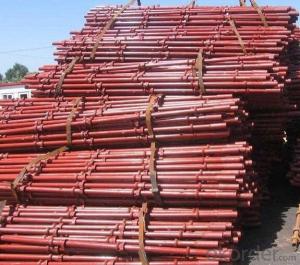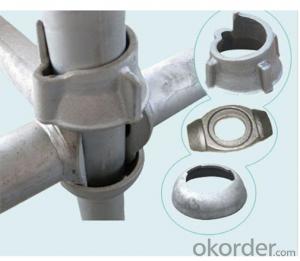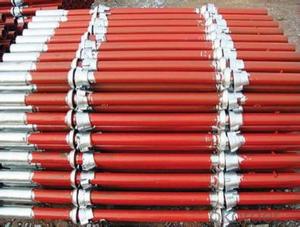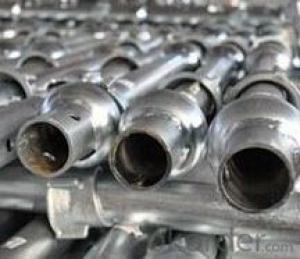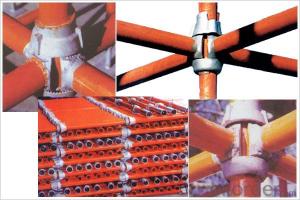BS1387 ,Q235,Scaffolding Steel Pipe High Quality
- Loading Port:
- Tianjin
- Payment Terms:
- TT or LC
- Min Order Qty:
- 20 m.t.
- Supply Capability:
- 15000 m.t./month
OKorder Service Pledge
OKorder Financial Service
You Might Also Like
1、Structure of BS1387 ,Q235,Scaffolding Steel Pipe High Quality:
Seamless pipe is formed by drawing a solid billet over a piercing rod to create the hollow shell. As the manufacturing process does not include any welding, seamless pipes are perceived to be stronger and more reliable. Historically seamless pipe was regarded as withstanding pressure better than other types, and was often more easily available than welded pipe.
2、Main Features of BS1387 ,Q235,Scaffolding Steel Pipe High Quality:
• High manufacturing accuracy
• High strength
• Small inertia resistance
• Strong heat dissipation ability
• Good visual effect
• Reasonable price
3、BS1387 ,Q235,Scaffolding Steel Pipe High Quality Specification:
Standard | GB, DIN, ASTM ASTM A106-2006, ASTM A53-2007 |
Grade | 10#-45#, 16Mn 10#, 20#, 45#, 16Mn |
Thickness | 8 - 33 mm |
Section Shape | Round |
Outer Diameter | 133 - 219 mm |
Place of Origin | Shandong, China (Mainland) |
Secondary Or Not | Non-secondary |
Application | Hydraulic Pipe |
Technique | Cold Drawn |
Certification | API |
Surface Treatment | factory state or painted black |
Special Pipe | API Pipe |
Alloy Or Not | Non-alloy |
Length | 5-12M |
Outer Diameter | 21.3-610mm |
Grade | 20#, 45#, Q345, API J55, API K55, API L80, API N80, API P110, A53B |
Standard | ASME, ASTM |
1) Material:20#(ASTM A 106/A53 GRB.API5LGRB,GB),45#,16Mn,10#.
2) Specification range:OD:21.3-610mm,WT:6-70mm,length:6-12m or according to the requirement of clients.
3) Excutive standards:GB,ASME API5L.ASTM A 106/A53,Despite of the above standards,we can also supply seamless steel pipe with standard of DIN,JIS,and so on,and also develop new products according to the requirements of our clients!
4) Surface:black lacquered,varnish coating or galvanized.
5) Ends:Beveled or square cut,plastic capped,painted.
6) Packing:bundles wrapped with strong steel strip,seaworthy packing.
4、Packaging & Delivery
Packaging Details: | seaworthy package,bundles wrapped with strong steel strip |
Delivery Detail: | 15-30days after received 30%TT |
5、FAQ of BS1387 ,Q235,Scaffolding Steel Pipe High Quality:
①How is the quality of your products?
Our products are manufactured strictly according to national and internaional standard, and we take a test
on every pipe before delivered out. If you want see our quality certifications and all kinds of testing report, please just ask us for it.
Guaranteed: If products’ quality don’t accord to discription as we give or the promise before you place order, we promise 100% refund.
②How about price?
Yes, we are factory and be able to give you lowest price below market one, and we have a policy that “ for saving time and absolutely honest business attitude, we quote as lowest as possible for any customer, and discount can be given according to quantity”,if you like bargain and factory price is not low enough as you think, just don’t waste your time.Please trust the quotation we would give you, it is professional one.
③Why should you chose us?
Chose happens because of quality, then price, We can give you both.Additionally, we can also offer professional products inquiry, products knowledge train(for agents), smooth goods delivery, exellent customer solution proposals.Our service formula: good quality+good price+good service=customer’s trust
SGS test is available, customer inspection before shipping is welcome, third party inspection is no problem.
6、BS1387 ,Q235,Scaffolding Steel Pipe High Quality Images:
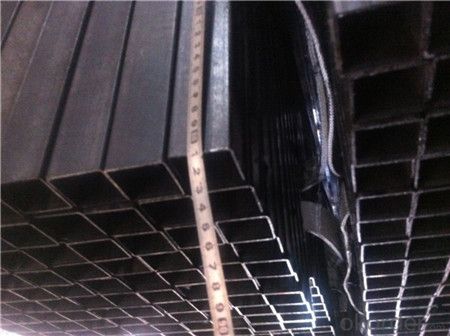
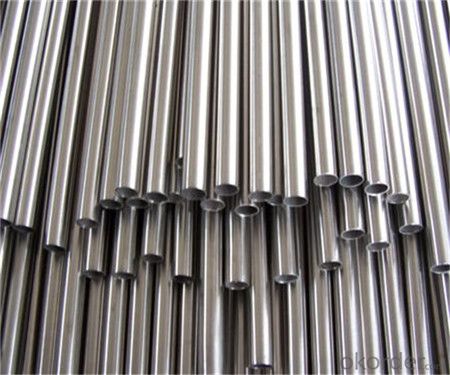
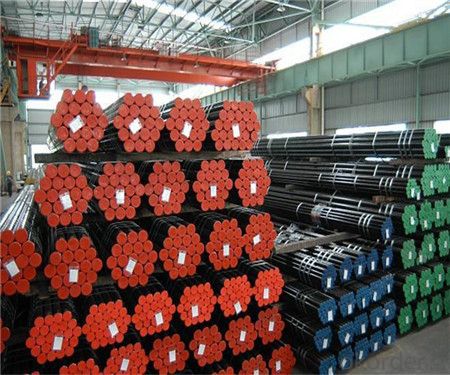
- Q: What is the standard length of a steel pipe?
- The standard length of a steel pipe can vary depending on the industry and application. However, in general, the standard lengths of steel pipes range from 18 to 24 feet. These lengths are commonly used in construction, plumbing, and other industrial applications. It is important to note that custom lengths can also be obtained to suit specific project requirements.
- Q: Can steel pipes be used for oil and gas well production?
- Yes, steel pipes can be used for oil and gas well production. Steel pipes are commonly used in the oil and gas industry due to their high strength and durability, which allows them to withstand the harsh conditions of drilling and production processes. Additionally, steel pipes can efficiently transport oil and gas over long distances, making them a preferred choice in the industry.
- Q: How do you prevent freezing in steel pipes during cold weather?
- To prevent freezing in steel pipes during cold weather, there are several measures that can be taken: 1. Insulate the pipes: Insulation is an effective way to protect steel pipes from freezing. Use insulation sleeves or wraps to cover the pipes, especially in areas where they are exposed to cold temperatures. Insulation helps retain heat and prevents the pipes from reaching freezing temperatures. 2. Seal any air leaks: Check for any gaps or openings around the pipes where cold air can enter. Use caulking or weatherstripping to seal these gaps and prevent cold air from reaching the pipes. 3. Maintain a consistent temperature: Ensure that the area where the pipes are located is adequately heated and insulated. Keeping the temperature above freezing will help prevent the pipes from freezing. If the pipes are exposed to extremely low temperatures, consider using heat tape or pipe heating cables to provide additional warmth. 4. Allow water to flow: Running a small, continuous trickle of water through the pipes can help prevent freezing. The flowing water generates heat and inhibits the formation of ice within the pipes. However, this method should only be used as a last resort, as it can waste water. 5. Drain the pipes: If the steel pipes are in an area that is not regularly used or if freezing weather is expected, it may be advisable to drain the pipes completely. Turn off the water supply and open all faucets to allow the water to drain out. This eliminates any standing water that could freeze and cause the pipes to burst. It is important to note that prevention is key, as frozen steel pipes can lead to costly damages and water leaks. By implementing these measures, you can protect your steel pipes and ensure they remain functional during cold weather.
- Q: How are steel pipes used in water transportation?
- Steel pipes are commonly used in water transportation due to their durability and strength. They can be used for various purposes, such as carrying water from a source to a treatment plant, distributing water to different areas, and even for sewage systems. Steel pipes are highly resistant to corrosion and can withstand high pressure, making them ideal for long-distance water transportation.
- Q: Can steel pipes be used for water supply systems?
- Yes, steel pipes can be used for water supply systems. Steel pipes are commonly used in water supply systems due to their durability, strength, and resistance to corrosion. However, it is important to ensure that the steel pipes are properly coated or lined to prevent any potential leaching of metals into the water supply. Additionally, regular maintenance and inspection is necessary to prevent any damage or deterioration that could affect the overall integrity of the water supply system.
- Q: What connections are there for concrete filled steel tubular column foundations?
- Application of double beam connection node usually uses "I" shape columns and steel bracket which is around the construction technology of a modern steel concrete column girder casting formed in the steel pipe outside through the two structures, the bearing pin four axis and four angles on the common components of stress transfer. The construction technology in the application is usually used at both ends of the stress transfer construction mode, through the four steel bracket to the corresponding shear stress, avoid crack width because the node contact produces clear, delayed cracks, improve anti cracking ability of regional nodes.This node model in the connection when the longitudinal reinforcement without through the tube, without bending the construction can be carried out directly, with easy construction technology, construction control difficulty, the economic benefits of construction at the same time, the advantage of low reinforcement to save. In this joint engineering technology, the key pride is to control the stress transfer of steel bracket.
- Q: How are steel pipes used in the construction of railways and transportation systems?
- Steel pipes are used in the construction of railways and transportation systems primarily for their durability and strength. They are utilized for various purposes such as the fabrication of tracks, bridges, tunnels, and support structures. Steel pipes provide a reliable and long-lasting solution for the transportation industry, ensuring the safety and efficiency of railway systems.
- Q: How are steel pipes protected against abrasive wear?
- Steel pipes are protected against abrasive wear through various methods such as lining the interior of the pipes with abrasion-resistant materials, applying protective coatings on the pipe surface, or using ceramic tiles or liners. These measures help minimize the effects of friction and abrasion, ensuring the longevity and durability of the steel pipes.
- Q: What are the different types of joints used in steel pipes?
- There are several types of joints commonly used in steel pipes, including threaded, welded, flanged, and grooved joints.
- Q: What is the difference between steel pipe and aluminum pipe?
- The main difference between steel pipe and aluminum pipe lies in their composition and properties. Steel pipe is made primarily of iron and carbon, with other elements added to enhance its strength and durability. It is known for its high tensile strength, resistance to corrosion, and ability to withstand high temperatures and pressure. On the other hand, aluminum pipe is made from aluminum, which is a lightweight metal known for its excellent corrosion resistance, thermal conductivity, and malleability. While steel pipe is generally stronger and more rigid, aluminum pipe is lighter and more easily manipulated. Additionally, steel pipe is often used in applications where strength and durability are critical, such as in construction and plumbing, while aluminum pipe is commonly used in industries that require lightweight materials, such as aerospace and automotive.
Send your message to us
BS1387 ,Q235,Scaffolding Steel Pipe High Quality
- Loading Port:
- Tianjin
- Payment Terms:
- TT or LC
- Min Order Qty:
- 20 m.t.
- Supply Capability:
- 15000 m.t./month
OKorder Service Pledge
OKorder Financial Service
Similar products
Hot products
Hot Searches
Related keywords
